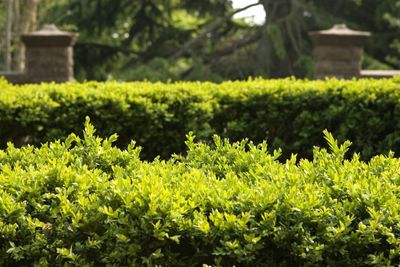Choosing Landscape Hedges
Here’s something you need to do before you start growing hedges in zone 7 or even selecting hedge plants for zone 7. You’ll need to invest some time into choosing landscape hedges and consider what it is exactly you want to use them for. For example, do you want a single row of similar bushes to create a “green wall” effect? Perhaps you’re looking for a very tall, tight line of evergreens. Something airy that includes flowering shrubs? The type of hedge or privacy screen you decide to create goes a long way toward narrowing down your choices.
Popular Hedge Plants for Zone 7
If you want a hedge to block your yard from winds or to provide a year-round privacy curtain, you’ll want to look at evergreen hedge plants for zone 7. Deciduous plants lose their foliage in winter, which would defeat the purpose of growing hedges in zone 7. But that doesn’t mean that you have to turn to the ubiquitous Leyland cypress, although they grow well and very quickly in zone 7 hedges. How about something different, like broad-leafed evergreen American holly? Or something bigger, like Thuja Green Giant or Juniper “Skyrocket”? Or how about something with interesting shades of color? Blue Wonder spruce will give your hedge an elegant bluish tinge. Or try variegated privet, a rapidly growing hedge plant with white tones and a rounded shape. For flowering hedges, look at yellow-blossomed border forsythia in zones 4 through 8, shrub dogwoods in zones 3 through 7, or summersweet in zones 4 through 9. Maples make lovely deciduous hedges. If you want shrubs, try delicate Amur maple in zones 3 through 8 or for larger zone 7 hedges, look at hedge maple in zones 5 through 8. Even taller yet, Dawn redwood is a deciduous giant that thrives in zones 5 through 8. Bald cypress is another tall deciduous tree to consider when you are growing hedges in zone 7. Or go with hawthorn, zones 4 through 7, or European hornbeam in zones 5 through 7.
